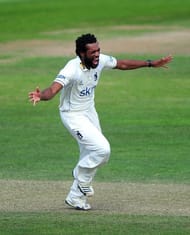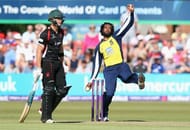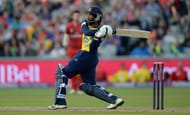
In many ways, Recordo Gordon is your archetypal professional cricketer.
The 27-year-old was born in Jamaica but is a Birmingham product, having moved to the UK with his parents when he was seven. From there, he came up through the junior ranks with local county Warwickshire aged 15. He made his first-class debut in 2013, aged 21 and the right-arm paceman quickly established himself in the limited overs formats, especially in the T20 format as a death bowler for the Birmingham Bears.
In a high-quality Warwickshire unit, which included the likes of Ian Bell, Johnathan Trott, Chris Woakes and Rikki Clarke but to name a few, Gordon was part of the squad that captured the T20 Blast title in 2014 and Royal London One-Day Cup in 2016. That same year, however, he was released from his Warwickshire contract.
Since then, he has been plying his trade in the minor counties with Cambridgeshire, whilst focusing on other interests that include his own sports coaching business. He has come down to Australia this summer to test himself in one of the toughest places to play cricket, in a bid to regain another county cricket contract.
Here, he spoke to Sportskeeda about his aspirations for his time in Australia and the path back to the top level in England, including his working relationship with West Indian fast bowler Jerome Taylor.
SK: Why have you come over to Australia?
RG: I have always wanted to come overseas to play and get that experience. So when the offer was made through my agent, Jodie Brown, who is based in Melbourne, it was an easy decision. It's my first time here in Australia and so far I am loving it.

I came over because I want to learn and absorb the Australian style of play. If you look back in history, you will see two of the most dominant nations of recent times are the West Indies and Australia. The style, energy and manner in which they play their cricket is something you want to learn and replicate.
Playing down here, I expect to find out a lot more about my character and my game. I'll be playing on tough pitches, in hot weather conditions and understanding more about my cricket. I'm looking forward to seeing what the challenge in Australia brings.
SK: Who are you playing for and what is your role going to be over the next few months?
RG: I'm playing at Gisborne Cricket Club based in Victoria, near Melbourne and have come over as the overseas professional for the season. The club is part of the local District Cricket Association (DCA) competition.
While the DCA it is not Premier Cricket, the standard from what I have seen so far is pretty good. I've seen a lot of premier league clubs and this is a proper set-up. Cricket is a bigger sport in Australia than England, so everything is a lot more established. County cricket and State cricket over here are pretty similar from what I have viewed, but club cricket is stronger over here compared to back home. It's a more professional operation.
I came over because I want to learn and absorb the Australian style of play. The style, energy and manner in which they play their cricket is something you want to learn and replicate.
In addition to being the overseas professional, I have a couple of other roles. I am the assistant to the head coach Glenn Waites for the senior side. As the assistant coach, I work as the sounding board for him, in order to help the rest of the team. I am also in charge of the Under-17s, working with them to get them ready for senior cricket. That will include an elite two-month training programme early next year that I will be running, to help them understand their skills better and other aspects such as strength and conditioning.
SK: How have you found the competition so far?
RG: Pretty good, it's a bit different for me as it is my first time playing on a synthetic surface (artificial) as opposed to the usual turf. So, the pitches don't give you much assistance, there's a greater demand on the body when bowling and your fitness needs to be up to the mark.
You have to spend time working out the batters and being more tactical on what are lower, slower wickets. It's a good challenge for me though, because if I do well on pitches which give me little assistance, then I will be more confident on playing on turf pitches which will aid me better come the next English season.

In saying that, we have started well and are really starting to find our rhythm in the competition, and my bowling has been going well (20 wickets at an average of 10.35 in seven matches to date, including one five-wicket haul).
SK: Having played the majority of your career in England, how do you reflect back on your time with Warwickshire and what did you learn?
RG: It really was a childhood dream come true. It was pretty surreal, to begin with but then the reality sunk in that this was a job, my place of work. I quickly had to come to grips with figuring out what I had to do and where I fitted in with the side.
I learnt a lot about myself as a professional cricketer, being pretty young at the time. Just about having to work hard and a big one for me is understanding. That is a word I impart on a lot of the junior players coming through that I coach. It’s a lifestyle and you also must need to accept the social and mental aspects of being part of a professional outfit. There is always a responsibility and pressure to perform.
SK: At the time there was quite a lot of experience for you to call on on different occasions? With the likes of Chris Woakes, Johnathan Trott, William Porterfield, Rikki Clarke, Boyd Rankin and even Brendon McCullum in the side?
RG: In the changing rooms I had Bell to my left and Trott to my right, which was pretty cool. It was a learning curve for me to just take in how those senior professionals went about their preparation, their focus, what they wanted to get out of their practice sessions and who they turned to help with their game. That helped me understand the team environment and structure around me better.
(Playing for Warwickshire) was really was a childhood dream come true. It was pretty surreal, to begin with, but then the reality sunk in that this was a job, my place of work.
It was a great period of time for us. We won the T20 Blast in 2014 and made the semi-finals the following year, whilst making the final of the Royal London One Day Cup in 2014 and winning the title in 2016.
SK: Were you given a specific role in the team at the time? You had some success in the T20 formats, especially for Birmingham?
RG: I was picked as a white-ball death bowler. I found I could execute the yorker pretty well and bowled a good slower-ball and variations (with Clarke highlighting his leg-cutter in particular as very difficult to play). It was just about developing the skill and knowing how to use it, performing the right tricks at the right time. To that extent, I watched a lot of cricket and T20 tournaments such as the IPL to see how the best bowlers went about delivering those balls.
SK: In 2016 you were released by Warwickshire. At a time when they were looking to bolster their future with younger players, what do you think contributed to your release?
RG: I believe I didn't have the understanding of the real mental and social aspects of the game at the time. I worked hard in matches, training and the gym but sometimes that isn't enough. There was a change in coach and captain, and they wanted to go in a different direction, which is what they are doing now.

It was disappointing to be released. I was one of the leading white-ball bowlers for a time and was part of the Royal London One Cup-winning squad in that same year. Injuries did hamper me for a period as well which certainly didn't help, an initial stress fracture and then later a torn pectoral muscle. When there are other players waiting for their chance, you have to keep fit and performing under the pressure you become accustomed to.
SK: Being born in Jamaica, and with your West Indian heritage, have you spent much time there at all?
RG: I went over to Jamaica in late 2016 and trained with their first-class side under the guidance of (former West Indies pace bowler) Jerome Taylor and fitness coach David Bernard Senior. It was at their home base of Sabina Park in Kingston.
Before I started training with them I didn't realise how unfit I was. I really had to work hard to get up to the mark with the rest of the squad during practice and when I played some matches with the Jamaican team in their trial set-up. By the end of it, I think I was the fittest I had ever been physically.
Jerome is a world-class bowler and really helped me work on my run-up. Among the main things, he taught me were to drive through the crease during my delivery and get my knees forward. He's helped a lot of the fast bowlers in Jamaica.
SK: Is it a consideration to go to the West Indies and play there compared with England?
There's actually an abundance of fast bowlers in Jamaica, with a lot of bowlers there as good as myself. So I couldn't just, say, go over there and walk straight into the team. Contrary to what is depicted of West Indies cricket among various media channels, the cricket there is very strong and there are a lot of players with great potential coming through.
Guys like Fabian Allen, Oshane Thomas and Odean Smith who have all recently made their West Indies international debuts are ones to watch for sure. Just like with any set-up, I would have to work hard to make it in that squad.
SK: Since that time you have been working hard at your game in a bid to regain a county contract, playing for Cambridgeshire in the minor county leagues and also concentrating on your sports coaching business. What are your aspirations going forward? Is it important to keep other interests as a cricketer?
RG: The aim from here is to have a good, solid few months of cricket in Australia this season and put up some good performances with Gisborne and helping the club to the District titles, whilst improving my skills and fitness all the same. I hope that it will set me up for a big season with Cambridge next year, where I can send the right messages with consistent performances and work back towards getting another crack at County cricket, which is my main goal.
Also, while I didn't get drafted into the Caribbean Premier League last year, I put myself forward for the Asian APL and US T20 league drafts this year, and like a lot of players, am interested in pursuing the T20 leagues available and testing myself against the best. I think that's a measure of how professional a game cricket has become.
At 27, I still feel I have a lot to give to cricket in terms of playing and coaching. I'm nowhere near finished yet. It is definitely important to keep those interests and skills instilled in you because as a professional cricketer you won't always have that security to fall back on and will find yourself in situations where those skills are required. So, away from playing and training, focusing on coaching is a key part for me and I want to make the most of my cricketing ability.
Looking for fast live cricket scores? Download CricRocket and get fast score updates, top-notch commentary in-depth match stats & much more! 🚀☄️
